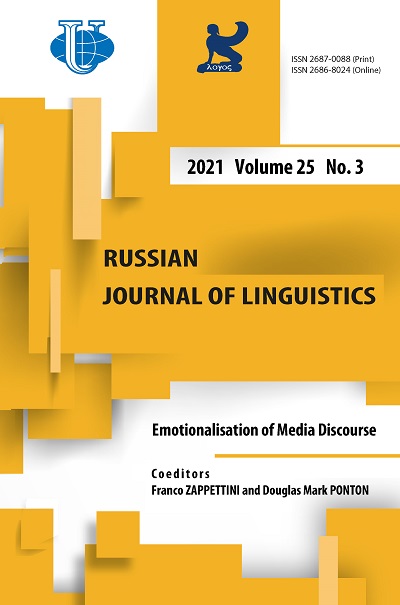
Photo from archive.org
The aim of this article is to give a general idea of how emotion concepts and meanings of Russian emotion words denoting destructive emotional states change in discourse, reflecting changes… Click to show full abstract
The aim of this article is to give a general idea of how emotion concepts and meanings of Russian emotion words denoting destructive emotional states change in discourse, reflecting changes in people’s understanding and evaluation of destructive emotions. The article focuses on changes in the terms for the specific emotions of gnyev ‘anger’, revnost’ ‘jealousy’, prezreniye ‘contempt’. The identified in-variant meanings of these lexemes are compared to their actualization in imaginative literature and pub-licistic contexts both synchronically and diachronically. The study of verbalization of emotional destructive concepts allowed the authors to identify their variability due to, firstly, overlapping and interpenetration of associative meanings in the peripheral semantics of the concepts, and, secondly, the discursive reali-zation of their names, reflecting the transformation of connotative meanings. The article concludes that the modification of the connotative meanings of emotion words results from the dynamics and inversion of linguo-cultural values associated with the attitude in a society to certain emotions, namely destructive ones, which reflect the shift in value orientation of the language personality. The data in the present study on emotion words came from dictionaries (explanatory and etymological ones) and from the Russian National Corpus. The methodological approaches employed in the study include the contextual analysis of particular words in the Russian National Corpus, as well as comparative analysis to reveal changes in the actual semantics and dynamics of the connotative meanings not fixed in modern dictionaries. The study expands on emotive linguistics and is based on the semantic-cognitive and discourse approaches towards emotion research of A.Wierzbicka (1999), H. Tissari (2017), B. Volek (1987), C. Gevaert (2007), Z. Ko-vecses (1990; 2005), G. Lakoff (1987), Z.D. Popova and J.A. Sternin (2007), V.I. Shakhovsky (2006; 2008), N.A. Krasavskiy (2008), S.G. Vorkachyov (2006) et al.
Journal Title: Russian Journal of Linguistics
Year Published: 2018
Link to full text (if available)
Share on Social Media: Sign Up to like & get
recommendations!